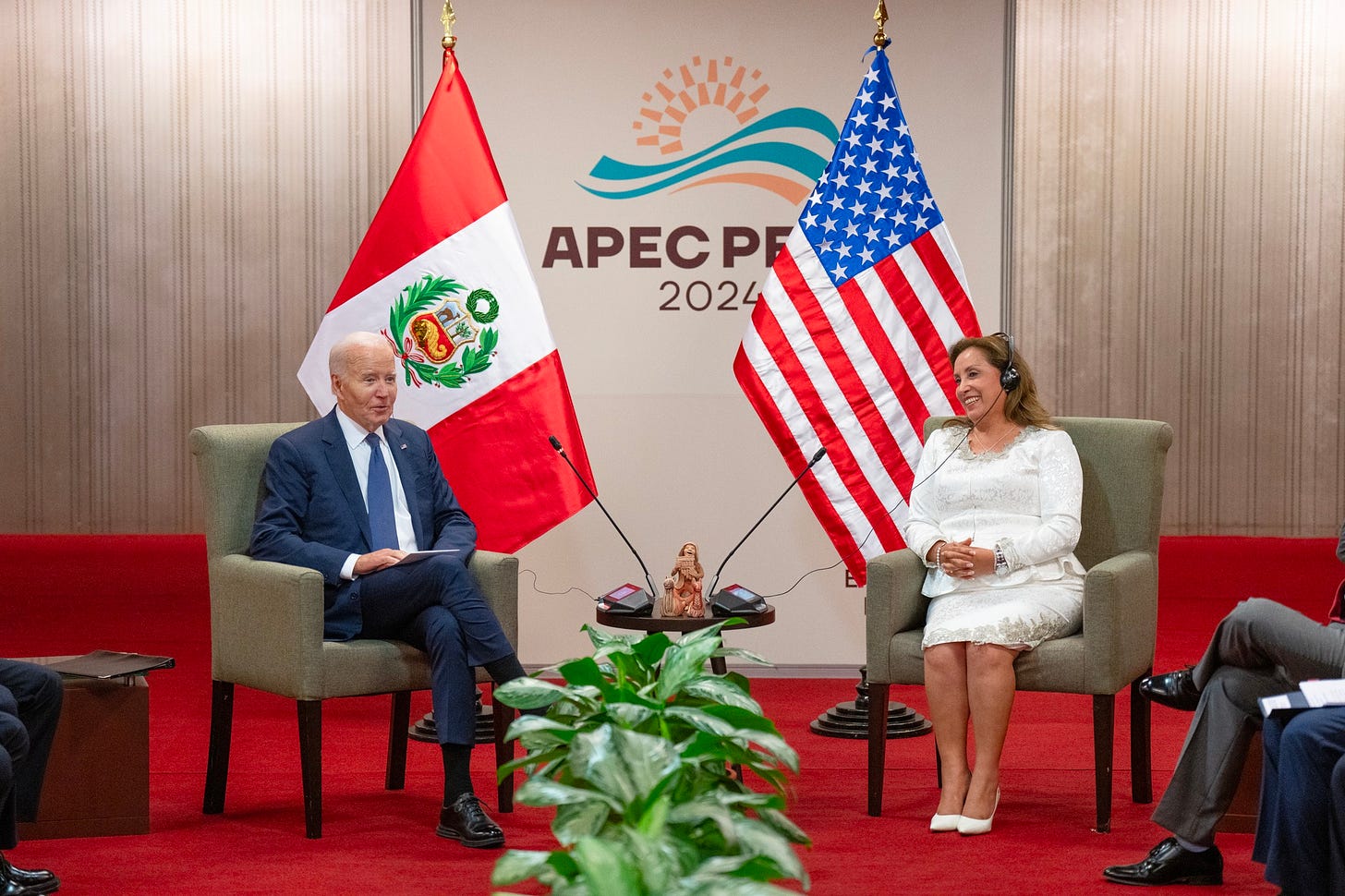President Biden’s Investing in America agenda, supported by the Bipartisan Infrastructure Law, has made historic investments in U.S. infrastructure, with over $695 billion allocated to more than 74,000 projects across all states, D.C., territories, and Tribal Nations. These investments target key areas, including roads, bridges, clean water, high-speed internet, climate action, and clean energy. Over 196,000 miles of roads have been improved, and 11,400 bridge repair projects have begun, reconnecting communities and enhancing safety. In addition, 367,000 lead pipes have been replaced, providing clean drinking water to nearly 1 million people, while 2.4 million homes and small businesses have gained access to high-speed internet. The agenda also prioritizes climate resilience, with over 6,000 projects aimed at mitigating the impacts of climate change and modernizing the electric grid through $62 billion in investments.
Sector-specific advancements include $66 billion for passenger rail, funding projects like the Brightline West high-speed rail connecting Las Vegas to Southern California, and $25 billion for airport modernization, with over 400 terminal projects underway. Ports and waterways have seen $17 billion in upgrades, including the modernization of Soo Locks in Michigan. Public transit improvements include deploying 4,600 and 8,900 clean school buses and prioritizing disadvantaged communities. Environmental initiatives have focused on plugging 9,600 orphaned oil and gas wells, cleaning up 95 Superfund sites, and removing hazardous fuels from 18 million acres to reduce wildfire risks.
The agenda has also created 940,000 construction jobs, achieving record-high employment in the sector. Workforce hubs and apprenticeship programs prepare Americans for good-paying infrastructure and clean energy jobs. To ensure timely implementation, the administration has accelerated permitting processes, cutting review times by six months while providing technical assistance to underserved communities to access funding opportunities. President Biden’s Investing in America agenda has laid the foundation for a stronger, more sustainable, and equitable future, transforming the nation’s infrastructure and creating economic opportunities for millions of Americans.
President Biden highlighted the progress made since signing the CHIPS & Science Act two years ago, particularly in boosting U.S. semiconductor manufacturing. He emphasized the United States' historical leadership in semiconductor innovation and its decline to produce just 10% of the world's chips, none of which are the most advanced.
The final agreement with TSMC, the world's leading advanced semiconductor manufacturer, will bring a $65 billion private investment to Arizona for three cutting-edge facilities. This project will create tens of thousands of jobs by the decade's end and marks the largest foreign direct greenfield investment in U.S. history. The first facility is set to open early next year, producing advanced chips for technologies like AI, smartphones, and autonomous vehicles.
Biden called this agreement a key milestone in implementing the bipartisan CHIPS & Science Act, underscoring its role in reshoring critical technologies, creating jobs, and bolstering national and economic security.
The United States celebrates its longstanding partnership with Peru, which will mark 200 years in 2026. This relationship spans critical areas such as diplomacy, trade, sustainable development, security, democracy, human rights, and environmental protection. Recent collaborations underscore the strength of these ties. In security and defense, the U.S. announced a $65 million counternarcotics package that includes the transfer of nine Black Hawk helicopters over the next five years. Since 2015, over $350 million has been provided to bolster Peruvian law enforcement's efforts against narcotics trafficking and organized crime. Joint initiatives include military exercises, cyber defense training, port security enhancements, and combating illegal fishing, further solidifying regional security efforts.
On the economic front, U.S.-Peru trade generated over $20.5 billion and created 1.1 million jobs in 2023, with significant investments in democratic institutions, health security, and sustainable agriculture. USAID has been pivotal, mobilizing $580 million since 2021 to support Peruvian farmers, expand internet access in rural Amazonian communities, and foster the cacao and coffee industries. These efforts have elevated Peru to the world’s second-largest organic cacao producer. Additionally, space cooperation has advanced, with Peru joining the Artemis Accords and partnering with NASA to leverage satellite data for environmental conservation and climate resilience.
Infrastructure development has also seen U.S. contributions, such as facilitating rail donations for Lima’s metro project, investing $500 million in seaport upgrades, and supporting $30 million in water security projects. Furthermore, technical support for public procurement reforms aims to combat corruption and improve infrastructure quality. Cultural and educational exchanges remain a cornerstone of the U.S.-Peru relationship, with over 14,000 Peruvians participating in U.S.-sponsored programs and a record number of visas processed in 2024. These initiatives, alongside investments in English language programs and cultural preservation, reflect the depth and breadth of a partnership that continues to thrive across security, economic, innovation, and cultural dimensions.
During a bilateral meeting in Lima, Peru, President Dina Boluarte warmly welcomed President Biden and his delegation to the APEC 2024 Leaders' Week. He expressed gratitude for the shared interests and cooperation fostered through the forum. President Biden reciprocated the sentiments, praising Peru's hospitality and describing the nation as a valued partner in addressing regional challenges, defending democracy, protecting the environment, and creating good-paying jobs for their citizens.
President Biden highlighted three key areas of growing collaboration between the United States and Peru. First, he announced $65 million in U.S. assistance over the next five years to combat drug trafficking, which includes the delivery of nine Black Hawk helicopters and training for over 130 Peruvian pilots and technicians. Second, he emphasized infrastructure cooperation, noting the donation of 150 passenger cars and locomotives from California Caltrain to the Lima metro rail system, an initiative expected to save Peru millions, reduce pollution, and deepen business ties. Third, he highlighted advancements in space exploration, acknowledging Peru’s recent alignment with the Artemis Accords and the agreement to cooperate on research rockets.
President Biden concluded by commending President Boluarte’s leadership within APEC and expressing his eagerness for continued discussions and collaboration. The meeting underscored the strong and multifaceted partnership between the two nations, blending humor, mutual respect, and a shared commitment to progress.
The Joint Statement of Japan, the Republic of Korea (ROK), and the United States highlight the deepening trilateral partnership to promote human rights, democracy, and regional security in the Indo-Pacific and beyond. The three countries announced the establishment of a Trilateral Secretariat to coordinate and implement shared objectives, strengthening their collaboration across defense, economic, and technological sectors. Enhanced security measures include joint military exercises, real-time sharing of ballistic missile data, and bolstered missile defense capabilities. The leaders reaffirmed their commitment to a free and open Indo-Pacific region, emphasizing opposition to coercive activities in the South China Sea and reaffirming peace across the Taiwan Strait.
The statement condemns North Korea’s violations of United Nations Security Council resolutions, illicit revenue generation, and deepening military cooperation with Russia amid the war in Ukraine. The leaders reiterated their commitment to the complete denuclearization of the Korean Peninsula and to enforcing sanctions to curb North Korea’s destabilizing actions. They also pledged to combat North Korea’s malicious cyber activities and protect critical infrastructure from disruptive cyber threats.
Economic cooperation remains a central focus, with efforts to enhance supply chain resilience, particularly for critical minerals, semiconductors, and pharmaceuticals. Initiatives such as the Trilateral Technology Leaders Training Program and the Disruptive Technology Protection Network aim to foster innovation in artificial intelligence, quantum computing, and biotechnology. The statement also emphasized the importance of sustainable economic growth and development assistance, highlighting expanded trilateral efforts in the Philippines and Ukraine, focusing on infrastructure modernization and digital connectivity.
To strengthen people-to-people ties, the countries celebrated the success of the Trilateral Global Leadership Youth Summit. They announced the launch of the Young Trilateral Leaders Program, aiming to engage the next generation in addressing global challenges. These efforts reflect a broader commitment to advancing shared values and ensuring peace and stability in the Indo-Pacific region. The leaders affirmed their partnership as a stabilizing force for global prosperity and security in the years ahead.
During the trilateral meeting in Lima, Peru, President Biden, Prime Minister Ishiba Shigeru of Japan, and President Yoon Suk Yeol of South Korea emphasized the importance of their partnership in addressing regional and global challenges. The leaders reflected on the progress made since their first leader-level summit at Camp David 15 months ago, which marked the beginning of a new era of trilateral cooperation. They highlighted how this partnership has expanded beyond security to include economic collaboration, advanced technologies such as AI and quantum technology, and youth exchanges, solidifying their commitment to peace and stability in the Indo-Pacific region.
President Biden praised the strengthened ties between the three nations, expressing pride in the partnership’s development and optimism for its lasting impact on regional stability. President Yoon acknowledged the growing importance of their cooperation, noting that it aligns with national interests while addressing global crises. He commended President Biden’s leadership in institutionalizing the partnership and emphasized its tangible results, such as establishing regular high-level consultations and launching a trilateral secretariat. Prime Minister Ishiba highlighted the critical role of the Japan-U.S. and U.S.-ROK alliances in maintaining regional peace. He pointed to recent milestones, such as the Freedom Edge joint military exercise, as evidence of their enhanced security collaboration.
The meeting underscored the leaders’ shared vision of a comprehensive and institutionalized trilateral framework that addresses complex security and economic challenges. They reiterated their commitment to countering threats like North Korea’s destabilizing actions and growing ties with Russia while fostering a stable, prosperous Indo-Pacific region. This gathering likely marks President Biden’s final trilateral engagement with the group, and he expressed confidence in the enduring strength of the partnership.
First Lady Dr. Jill Biden expressed gratitude and pride at the dedication of the Student Success Center at Delaware Technical Community College in her honor. She reflected on her teaching journey at Del Tech over 30 years ago, emphasizing how it felt like "home" from her first visit. She highlighted the transformative impact of community colleges, praising their flexibility and ability to meet diverse students' needs, from young graduates to working parents and veterans.
Dr. Biden celebrated the role of faculty and support services in helping students overcome obstacles and pursue meaningful careers. She shared personal stories of her students' resilience and underscored her commitment to community colleges, noting her continued teaching career while serving as First Lady.
She expressed gratitude to Delaware leaders, colleagues, and friends for their support and recognized the importance of affordable, accessible education in building pathways to the middle class. Dr. Biden concluded by dedicating the center as a beacon of inspiration for students, offering them hope and a sense of belonging as they pursue their dreams.
President Biden has proclaimed November 17–23, 2024, as National Apprenticeship Week, highlighting the critical role of Registered Apprenticeship programs in preparing workers for well-paying jobs and advancing key industries like clean energy, cybersecurity, and advanced manufacturing. His administration has invested over $730 million since he took office, hiring over one million apprentices nationwide. These efforts are bolstered by landmark legislation, including the American Rescue Plan, the Bipartisan Infrastructure Law, and the Inflation Reduction Act, which provide funding to expand apprenticeship opportunities and strengthen the workforce.
President Biden meets with President Dina Boluarte Zegarra of the Republic of Peru in Bilateral Meeting in Lima, Peru





